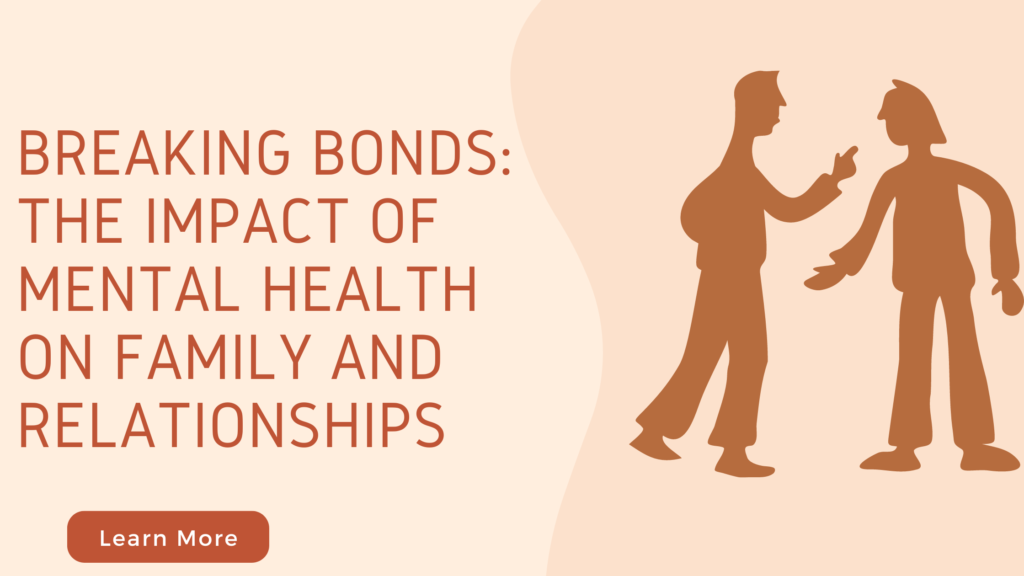Breaking Bonds: Affects of Mental health in the Family and the Relationships
Affects of mental health can have direct relation to the family and relationships. The mental health of the family and relationships is deeply impacted by small changes in communication and significant effects on emotional dynamics. In the complex procedure of family life, mental health serves as a hidden factor that determines connections and solidarity within the family.
Unveiling the Impact: The factor that mental health affects the family relations is the effect it has on the family dynamics.
Communication Breakdowns:
Mental health issues can hinder communication among family members, leading to emotional suppression and unresolved conflicts. Withdrawal, irritability, or mood swings can impede open communication, leading to misunderstandings and resentments. Parents and siblings may struggle to discuss mental health issues, leaving them unaddressed at home.
Emotional Distress:
he tension that builds up due to a family member’s mental health struggles can significantly affect the emotional well-being of the entire family. Emotions such as guilt, frustration, and helplessness often emerge as family members grapple with understanding their relative’s condition. The emotional weight of supporting a family member through mental health challenges can lead to burnout. It can also create overwhelming sense of empathy in another family member.
Role Reversals:
Being mentally unhealthy can disrupt family roles and dynamics, leading to role reversals or shifts in responsibilities. Families often become caregivers or provide significant support to loved ones facing mental health issues. These role changes can be stressful and lead to conflicts as members adjust to new tasks and responsibilities, creating tensions.
Navigating Relationship Challenges: Strategies for Coping with Mental Health Issues in Families
Cultivating Empathy and Understanding
Share the information about mental health and its effects on the family relationships with each other and arouse sympathy and understanding in each other.
Provoke the family members to be open-minded and attentive so as to make a non-judgmental and supportive atmosphere for them to voice their thoughts and emotions freely.
Seeking Professional Support:
Do not be shy to ask for the help of a health professional if you are having a hard time coping with the effects of mental health problems on yourself or the people in your family. Family therapy or counseling is a place where family members can express their feelings, enhance the communication, and work together on the problem-solving.
Setting Boundaries and Self-Care:
The boundaries should be created so that the personal mental and emotional health is protected and the person with mental challenges is also supported.
First of all, the self-care activities you could do are exercise, mindfulness and relaxation techniques which will help you to reduce stress and avoid burnout.
Building resilience involves expressing the strength of family bonds, which makes everyone feel completely connected to each other.
Embracing Vulnerability:
Indeed, the family should be open to all the feelings and the experiences because it is the only way to be vulnerable.
Express your difficulties and the obstacles that you face openly, thus, you will be able to develop a feeling of closeness and brotherhood among family members.
Fostering Resilience:
Rephrase the given sentence. We can develop resilience as a family by concentrating on our strengths, celebrating small victories, and supporting each other in hard times.
Make the activities that help in building the resilience such as problem-solving, goal-setting and positive reinforcement the part of your plans to help you overcome the challenges together.
Seeking Community Support:
Contact support groups, online forums, or community organizations focused on mental health for resources and instructions. Surround yourself with those who can provide emotional and practical assistance, including family members and professionals.
Embracing Healing and Growth:
On the contrary, the Journey Forward is the actual meaning of the phrase that states a possibility in the future of society.
Conclusions
To sum up, mental health profoundly and complicates family relationships. Misunderstandings often occur in communication, and we face many other challenges, from emotional distress to role reversals and strained dynamics. Managing these issues requires patience, empathy, and resilience.
By fostering an atmosphere of free speech, seeking professional help, and finding solutions, families can handle mental health problems together. Conquering fears, accepting community support, and becoming more resilient lead to recovery and growth.
Remember, you are not alone. With love, understanding, and support, families can overcome mental health challenges, becoming stronger, more connected, and more resilient than ever.
Did you like this article on affects of mental health? If yes, check our other articles on mental health disorders.



Recent Comments